August 16
“There they are, boys! We beat them today or Molly Stark sleeps a widow tonight. “
~John Stark
Battle of Bennington
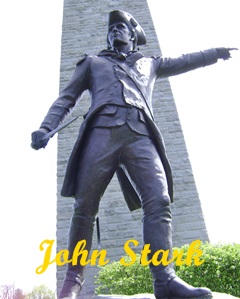
1777 – Americans led by General John Stark routed British and Brunswick troops under Friedrich Baum at the Battle of Bennington in Walloomsac, New York.
British General John Burgoyne had led his army down the Lake Champlain-Hudson River corridor with apparent ease, capturing several American forts along the way. However, he found himself in desperate need of provisions, wagons, cattle, and horses. Burgoyne then made the fateful decision to send an expeditionary force of 650 men – under Colonel Baum – to the town of Bennington to capture these much needed supplies.
Baum was not expecting any major opposition. To his surprise, nearly 2,000 American militia men led by General Stark of New Hampshire were waiting for him near the Walloomsac River in New York.
During the intense battle, Baum was mortally wounded and his troops surrendered. While Stark’s militiamen were busy disarming the prisoners and looting their supplies, Heinrich vov Breymann – commander of the Breymann Grenadiers, a Brunswick battalion hired into British service – arrived with his reinforcements.
Seeing the Americans in disarray, they immediately pressed their attack.
After hastily regrouping, Stark’s forces tried to hold their ground against the new German onslaught, but began to fall back. Before their lines collapsed, Colonel Seth Warner’s Green Mountain Boys arrived on the scene to reinforce Stark’s troops.
Total German and British losses at Bennington were recorded at 207 dead and 700 captured. American losses included 30 dead and 40 wounded.

1841 – President John Tyler vetoed a bill which called for the re-establishment of the Second Bank of the United States. Enraged Whig Party members rioted outside the White House in the most violent demonstration on White House grounds in U.S. history.
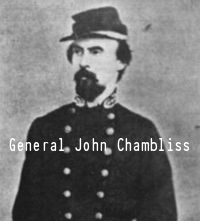
1864 – Confederate General John Chambliss was killed during a cavalry charge at the Second Battle of Deep Bottom in Virginia, one of the sieges of Petersburg. His death led to a surprising discovery by Union forces.
Chambliss’ body was recovered by Union General David Gregg, who found a detailed map of the Richmond defenses. Gregg gave the plan to Union topographical engineers, who then looked for a way to copy and distribute the map through the army’s command structure. Using a new photographic technique known as Margedant’s Quick Method, which did not require a camera, the engineers traced the map and laid it over a sheet of photographic paper. The paper was then exposed to the sun’s rays, which darkened the paper except under the traced lines.
The result was a mass-produced negative of the map, which was distributed to all Union officers in the area within 48 hours. The discovery did not help the Union capture Richmond – that would take another seven months – but it may have reduced casualties by preventing foolhardy attacks on well-defended positions.
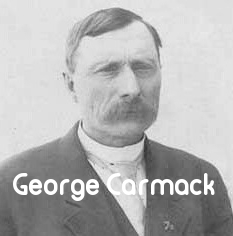
1896 – While salmon fishing near the Klondike River in Canada’s Yukon Territory, George Carmack spotted nuggets of gold in a creek bed. His discovery sparked the last great gold rush in the American West.
Carmack and two companions staked their claim the following day. News of the gold strike spread fast across Canada and the United States, and over the next two years, as many as 50,000 would-be miners arrived in the region. Rabbit Creek was renamed Bonanza, and even more gold was discovered in another Klondike tributary, dubbed Eldorado.
“Klondike Fever” reached its height in the United States in mid-July 1897 when two steamships arrived from the Yukon in San Francisco and Seattle, bringing a total of more than two tons of gold.
For his part, Carmack left the Yukon with $1 million worth of gold. Many individual gold miners in the Klondike eventually sold their stakes to mining companies, who had the resources and machinery to access more gold.
Large-scale mining in the Yukon Territory didn’t end until 1966, and by that time the region had yielded some $250 million in gold. Today, some 200 small gold mines still operate in the region.
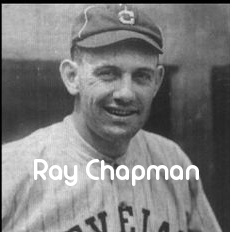
1920 – Cleveland Indians shortstop Ray Chapman was struck in the temple by a ball pitched by Carl Mays of the New York Yankees.
Despite a late-night operation to relieve the pressure on his brain, Chapman was pronounced dead at 12:30 a.m. the next day. It was the first and only death to occur as the result of a pitched ball in major league history.
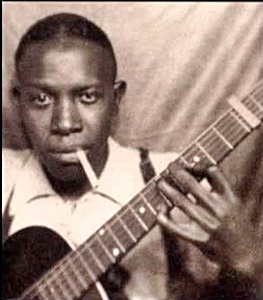
1938 – Blues musician Robert Johnson died at the age of 27, near Greenwood, Mississippi, of unknown causes. Johnson’s death was not reported publicly and no formal autopsy was ever done.
His landmark recordings in 1936 and 1937 display a combination of singing, guitar skills, and songwriting talent that has influenced later generations of musicians. Although his recording career spanned only seven months, he is recognized as a master of the blues, particularly the Delta blues style, and one of the most influential musicians of the 20th century. The Rock and Roll Hall of Fame describes him as being “the first ever rock star.”
According to legend, as a young man living on a plantation in rural Mississippi, Johnson had a tremendous desire to become a great blues musician. One of the legends often told says that Johnson was instructed to take his guitar to a crossroad near Dockery Plantation at midnight. There he was met by a large black man (the Devil) who took the guitar and tuned it. The Devil played a few songs and then returned the guitar to Johnson, giving him mastery of the instrument. In exchange for his soul, Johnson was able to create the blues for which he became famous.
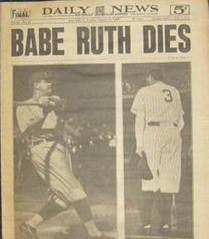
1948 – Baseball legend George Herman “Babe” Ruth died from cancer in New York City.
At a time when baseball was suffering through the disgrace of the Black Sox scandal, the “Sultan of Swat” had salvaged the sport’s popularity, hitting a record 60 home runs in the 1927 season and leading the Yankees to seven pennants.
Yankee Stadium, opened in 1923, came to be known as “the House that Ruth Built.”
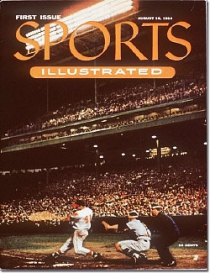
1954 – The first issue of Sports Illustrated was published by Time Inc. Initially, the magazine was not profitable (and would not be so for 12 years) because much of the subject matter was directed at upper class activities such as yachting, polo and safaris.
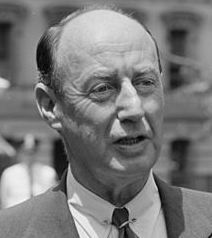
1956 – Adlai E. Stevenson was nominated for president at the Democratic National Convention in Chicago. The former governor of Illinois had been soundly defeated by Republican Dwight Eisenhower in 1952 and the campaign of 1956 would be no different. Eisenhower won 41 of the 48 states.
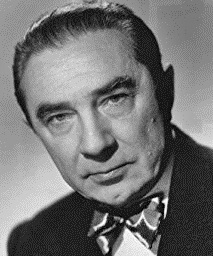
1956 – Actor Bela Lugosi, most widely identified with his title role in the movie Dracula, died of a heart attack at the age of 73.
Following Dracula, he was soon typecast in B-horror films such as Murders in the Rue Morgue, Chandu the Magician, Mark of the Vampire, and Son of Frankenstein.
His final film, Plan 9 from Outer Space, an Ed Woods low budget horror flick, was completed after his death.
Contrary to popular belief, Lugosi never requested to be buried in his vampire cloak. His son confirmed on numerous occasions that he and his mother, Lillian, actually made the decision but believed that it is what his father would have wanted.
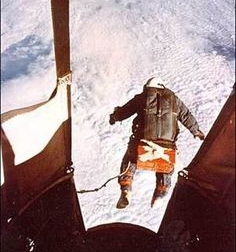
1960 – Joseph Kittinger parachuted from a balloon over New Mexico at 102,800 feet, setting three records that held until 2012: High-altitude jump, free fall, and highest speed by a human without an aircraft.
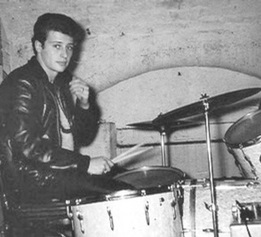
1962 – Just as the Beatles were on the verge of becoming recording stars, drummer Pete Best was fired by manager Brian Epstein and replaced by Ringo Starr two days later.
“Unbeknownst to me, they’d approached Ringo,” Best says. “Brian said, ‘Pete, I don’t know how to tell you this. The boys want you out. It’s already been arranged. I asked why and he said, ‘Because they think Ringo’s a better drummer.'”
Best says some rawness from that fateful day in 1962 still lingers, but he came to terms with it a long time ago.
“Yes, they are the most famous musicians in the world. And regardless of what happened, I played a key part in that.”
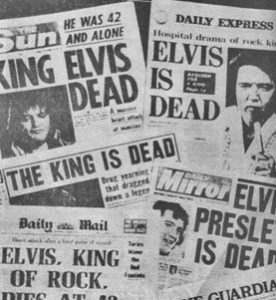
1977 – Music icon Elvis Presley died in Memphis, Tennessee. The “King of Rock N’ Roll” was 42.
Presley is an inductee in seventeen Halls of Fame, including the Rock and Roll Hall of Fame, Country Music Hall of Fame, Rockabilly Hall of Fame, and Gospel Hall of Fame.
With record sales of over 600 million, Elvis remains the best-selling single artist of all time.
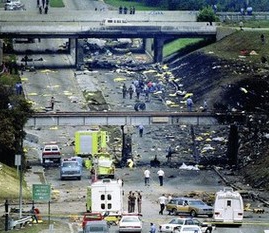
1987 – A plane crash at Detroit Metropolitan Airport in Michigan killed 156 people. A four-year-old girl was the sole survivor of the accident, which was caused by pilot error.
Northwest Flight 255 was headed to California with a stopover in Phoenix. While the DC-9 Super 82 taxied out to the runway, the pilot and co-pilot failed to conduct their pre-flight checks according to procedure and, as a result, the takeoff-warning system was never turned on. Later, there was speculation that the pilots may have been rushing the checks to avoid incoming bad weather.
A lack of communication between the pilot and co-pilot turned into a deadly mistake when neither extended the wing flaps prior to takeoff. As the plane rushed down the 6,800-foot runway, it lifted only 40 feet off the ground when it should already have been 600 feet in the air.
At the end of the runway, the plane hit lampposts and a rental-car office. The plane then crashed onto a road a half of a mile away. On the Interstate 94 Bridge in Romulus, the plane hit a car and killed both people in the vehicle.

1988 – Vice President George H.W. Bush selected Indiana Sen. Dan Quayle to be his running mate on the Republican ticket.
The convention is perhaps best known for Bush’s “thousand points of light” speech as he accepted the nomination. It included the “read my lips: no new taxes” pledge that was the most popular sound bite coming out of the convention, but would later come back to haunt him.
While Bush was nominated without opposition during the roll call vote, there were rumblings of opposition to the Quayle nomination. It was decided to have it ratified by voice vote, something that the Republicans had never done before.
Bush and Quayle would go on to defeat the Democratic ticket of Massachusetts Governor Michael Dukakis and Texas Senator Lloyd Bentsen by 7 million popular votes and 315 electoral votes.
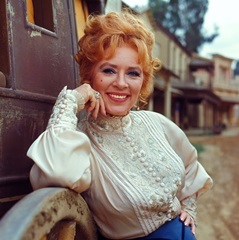
1989 – Actress Amanda Blake, best known for her 19-year role of “Miss Kitty Russell” on the television series Gunsmoke died of liver failure brought on by AIDS-related viral hepatitis. She was 60.
After her death, a statement by the hospital and her friends reported the cause of death as cancer. Her death certificate, however, listed the immediate cause as cardiopulmonary arrest due to liver failure and CMV hepatitis. CMV, or cytomegalovirus hepatitis, is AIDS-related.
Her close friends insisted that she was not a drug user or sexually promiscuous, and that she may have acquired the disease from a former husband, Mark Spaeth, who died at 41 in 1985 of AIDS-related pneumonia.

2000 – Delegates to the Democratic National Convention in Los Angeles nominated Vice President Al Gore for president.
In what was one of the closest presidential races in history, Gore and running mate, Connecticut Senator Joe Lieberman, defeated the Republican ticket of George W. Bush and running mate Dick Cheney by 500,000 votes in the popular vote, but lost by 4 votes in the Electoral College after a contentious, 5–4 Supreme Court decision in Bush v. Gore (Florida), ruled in favor of Bush.
It was the fourth time the winning candidate lost the popular vote … but it certainly wasn’t the last.
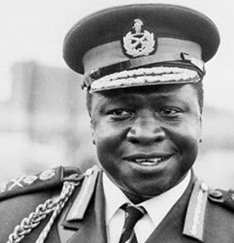
2003 – Idi Amin, the former dictator of Uganda, died in Saudi Arabia. His exact age was unknown but was believed to be between 75 and 80.
Amin’s rule was characterized by rampant human rights abuses, political repression, ethnic persecution, extrajudicial killings, corruption, and gross economic mismanagement. The number of people killed as a result of his regime is estimated by international observers and human rights groups to range from 100,000 to 500,000.
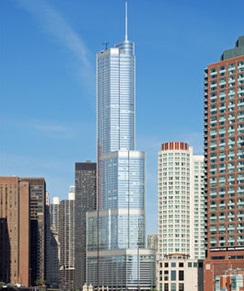
2008 – The Trump International Hotel and Tower in Chicago was topped off at 1,389 feet, becoming (at the time ) the world’s highest residence above ground-level.
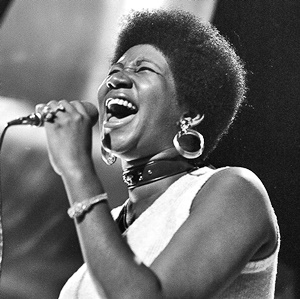
2018 – Aretha Franklin died at the age of 76. The cause of death was a malignant pancreatic neuroendocrine tumor.
Referred to as the “Queen of Soul”, Rolling Stone twice named her as the greatest singer of all time. With global sales of over 75 million records, Franklin is one of the world’s best-selling music artists.
Her hit songs included “I Never Loved A Man (The Way I Love You)“, “Respect“, “(You Make Me Feel Like) A Natural Woman“, “Chain of Fools“, and “Think“.
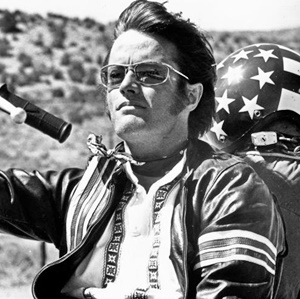
2019 – Actor Peter Fonda died from respiratory failure caused by lung cancer at the age of 79.
A prominent figure in the counterculture of the 1960s, Fonda was nominated for the Academy Award for Best Original Screenplay for Easy Rider (1969), and the Academy Award for Best Actor for Ulee’s Gold (1997).
Compiled by Ray Lemire ©2023 RayLemire.com. / Streamingoldies.com. All Rights Reserved.